I enjoyed the Brat Pack, at points it was a bit cringey, and then it was nostalagic. I left loving Demi Moore and Rob Lowe but overall I left with more questions than I had answers.
Let me break it down..
So this is the article that sends Andrew McCarthy on his journey but here’s the thing, he’s not part of the main story at ALL!
This is the only time he’s referenced in the very end of this giant profile and it’s by an unnamed BRAT PACKER who predicts his career won’t last and this article and also specifically distances him from THE BRAT PACK.
Yikes! Thats a very tough quote
But it’s interesting because while the quote is bad it actually separates him from the BRAT PACK
And what’s more surprising is that this article is very comprehensive, the author names alot of supposed BRAT PACK members.
I mean, Ethnic Chair is a wild thing to call Nic Cage but lets not even unpack that now.
But now you should be thinking, wait he’s really not mentioned anywhere else besides that one line? But it gets worse. He’s not even mentioned in this section about NEW YORK ACTORS in the Brat Pack, which he identifies as in the doc.
So after seeing ALL these names it really reframes the documentary. When you look at all the actors that are mentioned, I’d argue that the BRAT PACK label didn’t stick with 90% of them.
So I guess we are left wondering who is the Bratt Pack and honestly no one knows, even the documentary has a hard time figuring it out or agreeing to the defacto names.
I doubt anyone could exactly agree on who are the TOP 5
It’s worth noting no women are mentioned in the Bratt Pack article nor any actors of color (which there weren’t many/if any in this “Teen Film Revolution” again see Nic Cage as the champion of diversity).
A main thesis of this Doc is that this article undercut the TEEN/YOUNG ADULT MOVIE Revlution. But here’s a fact that surprised me, in the highest grossing films of 1985 The Breakfast Club came in 13th and St Elmo’s Fire 25. The documentary positions them as huge successes which they were culturally but that never changes.
In a very cursory look from 1985-1990 about 4 of the Top 20 movies of the year had a teen/young adult in the lead and the movies that came in 20-40 were alot more densely populated with Young Adult Films, seminal movies like Mystic Pizza, Young Guns, Heathers, About Last Night, Back to the Future, Young Blood, Girls Just Want to Have Fun and Last Dragon to name a few.
Then in 1986 Top Gun was #1 (and Tom Cruise is a member of the Brat Pack according to the article and illustration). Karate Kid 2 and Back to School both movies with prominent young leads are also coming in in 3 and 4 respectively. Then in 1987, Platoon, Secret of My Sucess and Stakeout (Emilio Movie) are all in the Top 10! So you could argue Teen/Young Adult Movies get bigger and stronger. The idea that big directors didn’t want to work with the Brat Pack is kinda flawed.
Additionally the main leads of this article, Emilio Estevez, Rob Lowe, and Judd Nelson seem to work relatively unscathed for the next few years. Some to great success Emilio and others less so, Judd. But I’d argue the success and failure of their careers are more driven more by what movies they did next and the success and failure of them which is the main point this article makes about Timothy Hutton.
There is also mention in the doc that these actors couldn’t work together because they wanted to avoid being pigeonholed but that isn’t true. Depending on your definition of the Brat Pack members, they work together a lot.
In 1988, Andrew McCarthy and Molly Ringwald are working together again in Fresh Horses. A big story about this Movie is that Molly Ringwald gets a huge payday (1 Million). So once again affiliation hasn’t hurt her. However this R Rated Coming of Age story doesn’t really work at the Box Office. The Reviews are bad and it’s a flop.
In his review for the Los Angeles Times, Michael Wilmington said, "[t]here's a lot to admire in the film adaptation of Larry Ketron's play 'Fresh Horses'" and called the dialogue "fresh, sad and funny." He also praised the work of director Anspaugh and cinematographer Fred Murphy, saying they give the movie "a very distinctive look: moody and poetic, grainy and wistful, drenched with a sad, faraway, forget-me-not drizzle of passion and regrets." However, he concluded that the "movie refuses to jell." Fresh Horses holds a 0% rating on Rotten Tomatoes based on six reviews.
So what’s happening here. It seems like every core thesis this doc makes is flawed.
Whats True? Yes, the article is “nasty” and you could make an argument that it starts a negative trend in celebrity journalism but most film historians know Gossip pages are always rough on stars. Look at what Orson Welles went thru on Citizen Kane during production.
But there is also another way of viewing it, that the author of the article caught a very unique night out with a very young and hot cast (who actually behave pretty well like most normal twenty year olds) and being out with them wasn’t an attempt to make them look bad as much as it was a exclusive look into the cool club, the new RAT PACK if you will and in trying to break it all down for the audience of the New Yorker in simplistic terms, he spells it out with clear/clever labels.
So why does Andrew McCarthy feel so slighted? Why does it stick or does he perceive it sticks to him. The most brutal explanation is that the term Brat Pack only stuck to those actors whose best work were Breakfast Club or St Elmos Fire.
It’s next to impossible to sustain a leading actor career yet alone 20 careers. Some won’t make it. Some won’t get 3rd or 4th chances. Which is a warning the Brat Pack tells themselves and the author in this article many times over. Tom Cruise famously recognized that after Beast and that led him to Top Gun with more creative control.
Honestly the most damning this article did was make them “stars” before they were actually were stars, they bought it (or AMC did) and he expected this career that he actually didn’t build but he was gifted from his roles in two iconic films. So you have this disconnect from what was felt vs what happened.
No one is guaranteed a career and some of the observations made by the journalist are quite prescient. So in many ways this article becomes a straw man that is controlling the fickle nature of celebrity.
But my BIGGEST ISUE is, why can’t McCarthy call out that he annd Judd were the ones truly slighted in this article. Judd is slighted by the author but AMC was insulted and slighted by the Brat Pack. Why can’t he address that one of the Brat Pack Members who probably was his friend (and maybe depending on who you ask were in this doc), said he would fail.
Or maybe even extrapolate how this giant article that everyone read might have painted him in a bad light as a bad actor.
Isn’t that more interesting? It certainly is more personal and this is a personal doc. It really seems at points like one man’s throat sessions and each conversation takes that turn where they realize they are helping him rather then reflecting on a group experience which does make it fascinating.
If he wanted to do something more general why not make a doc about how John Hughes films were so popular that they inadvertently stunted film careers, the same way that 80’s sitcom stars could rarely make the transition from TV to features. That at least is a more solid argument.
Brats wastes the equity it gets on these interviews by examining a label that clearly one person owns even if the ownership comes from hating it. All the others seemingly have moved on. Thats why the old footage is telling. Certain stars like Cryer say, no I’m not in the Brat Pack while a handful of others try to embrace it and fight it. Which is what the issue might be, it’s a school yard bully technique. The press liked pushing them into talking about it because they squirmed when they did.
I understand that a label like the Brat Pack is complicated and yet the doc isn’t.
Best Quote of the doc, “My wife says this doc will help with his humility.” Maybe it did but I’m not sure he knows that.
Final thoughts:
Do you think that these young adults got the RAT PACK/BRAT PACK Pun? And why is a Rat more appealing than a Brat
Why would Hollywood or these Actor try to distance themselves from each other - it’s an age old tradition in Hollywood from Preston Sturges to Martin Scorsese.
Was Emilio the unnamed source? His body language says yes
We never labeled the SCREAM cast. Did that help or hurt them and yet the outcome the same? Same for the cast of Friends. This is just showbiz.
On that note is the group with the most success independently that started together is Parks and Rec. What’s different about them?
I guess my big question is why did he continue down this road when he clearly saw the inception of doc idea and execution were different than he intended but he doesn’t adjust course and that tells me a lot too.
ONE MORE THING
If you want me to personally sign a copy of JOYFUL RECOLLECTIONS OF TRAUMA, Chevalier’s in LA will take your request, I’ll personalize and sign it and you will get it at COST! Support Indie Book Stores Sign up here
Also listen to Unspooled’s Summer Movie Kickoff wherever you get your podcasts


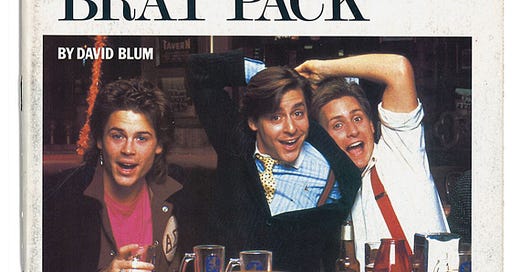



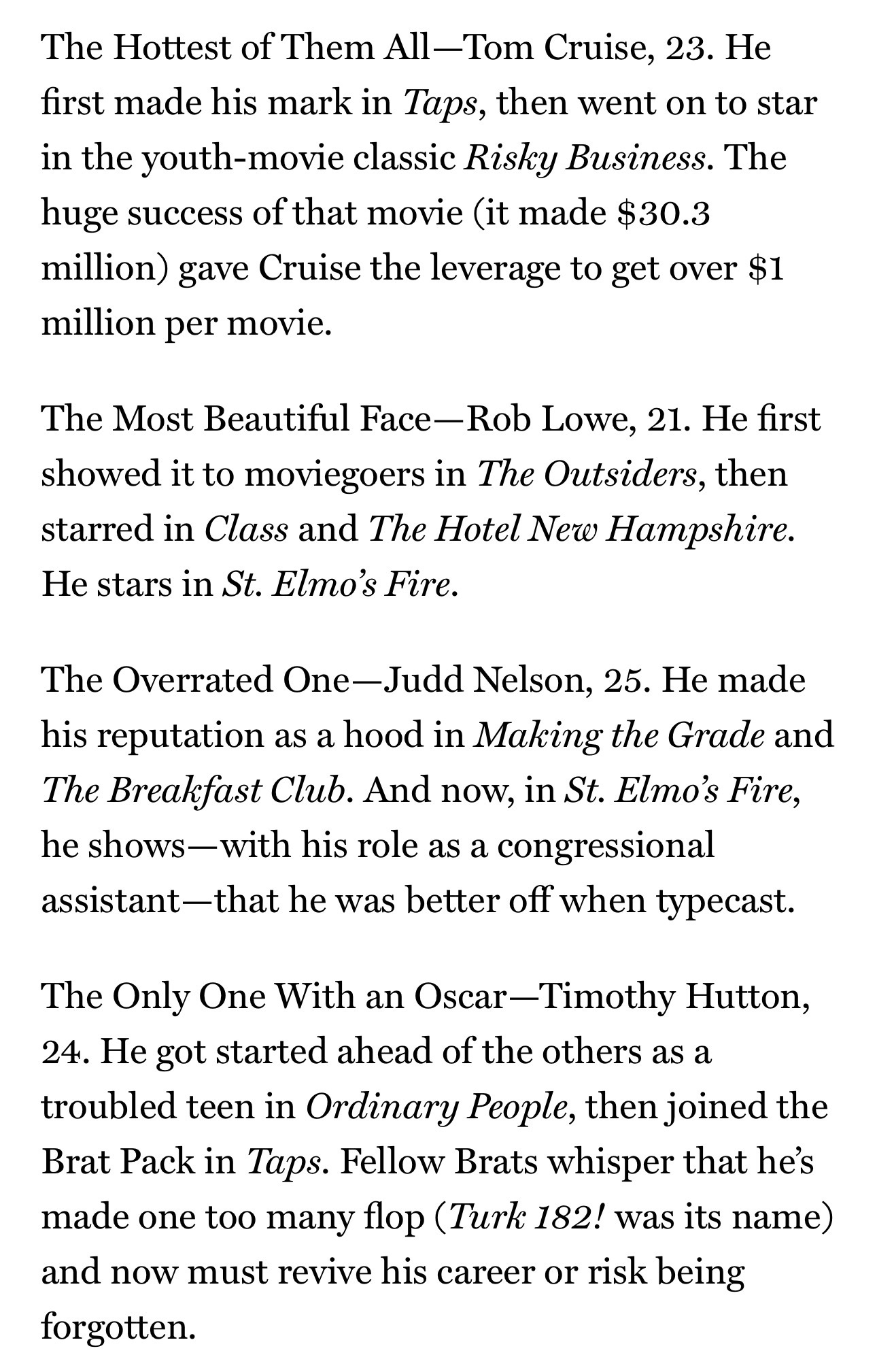
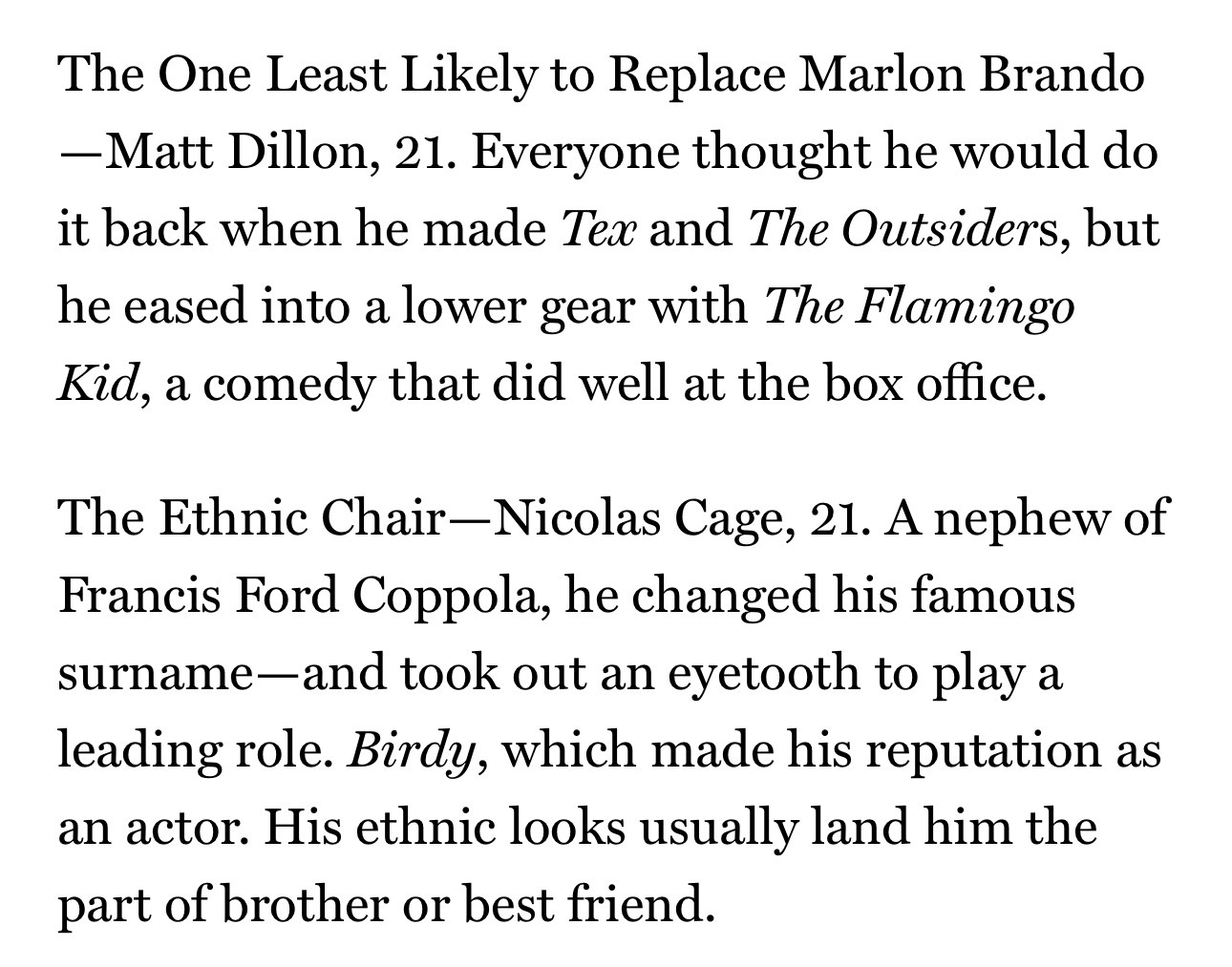
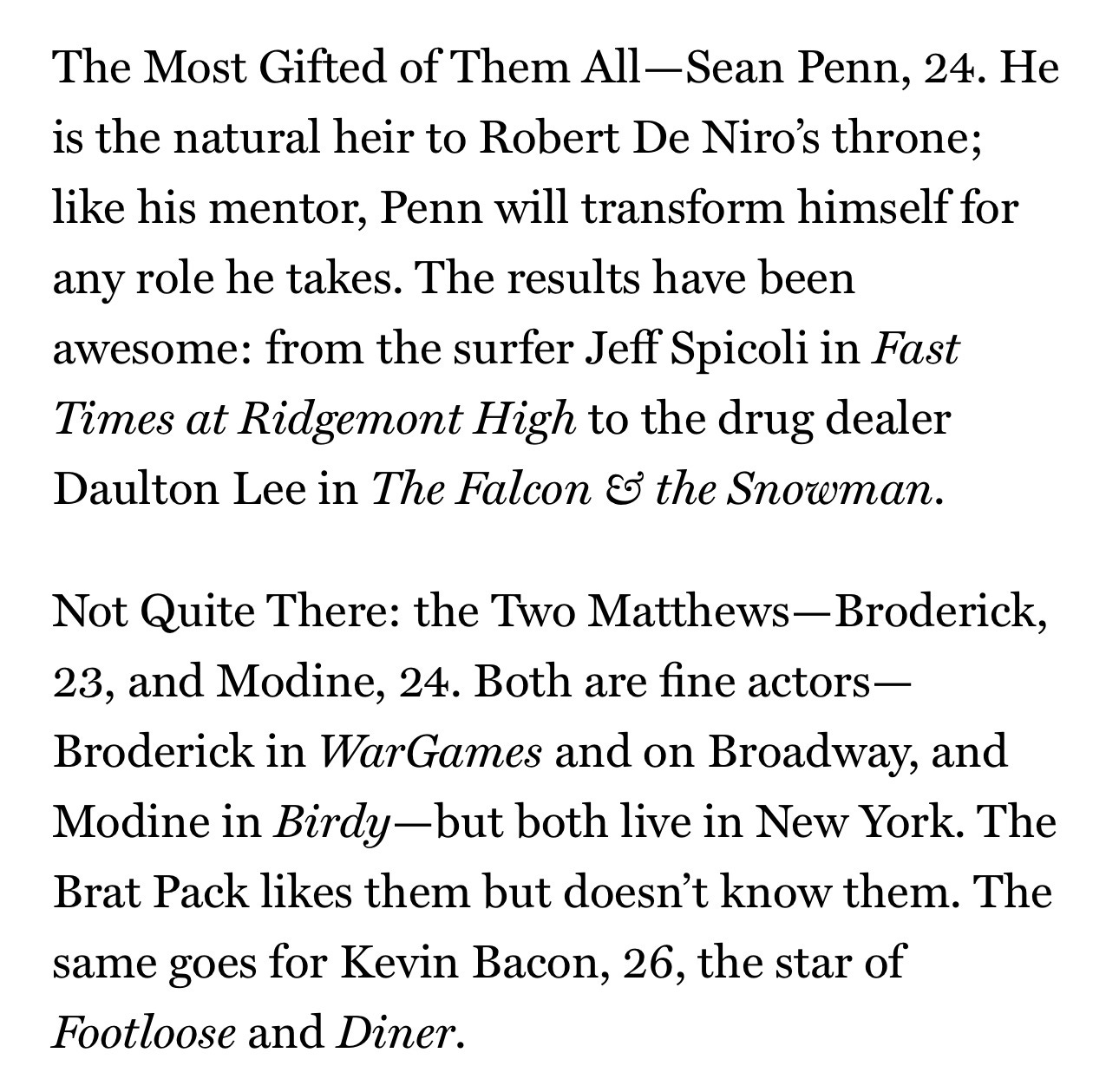
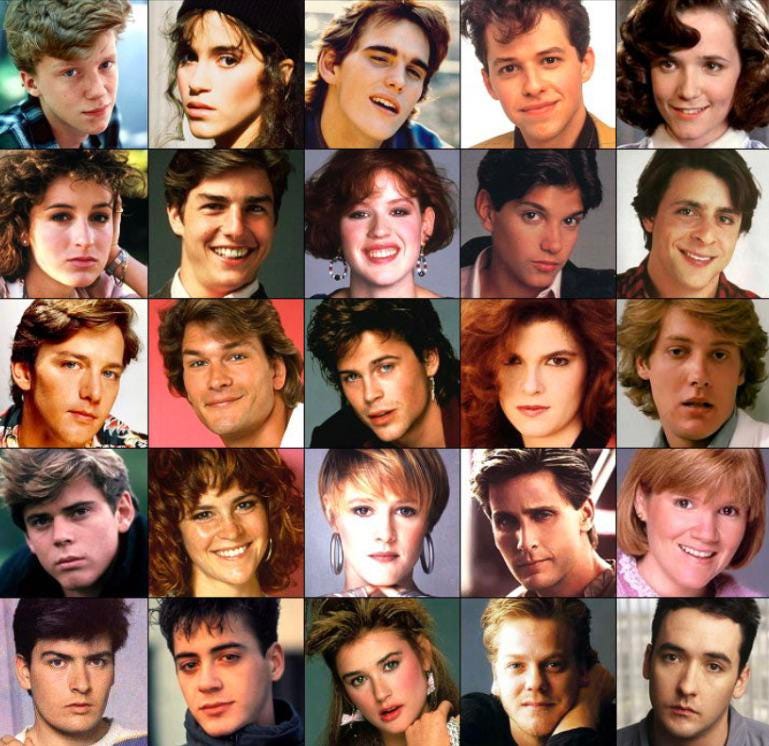
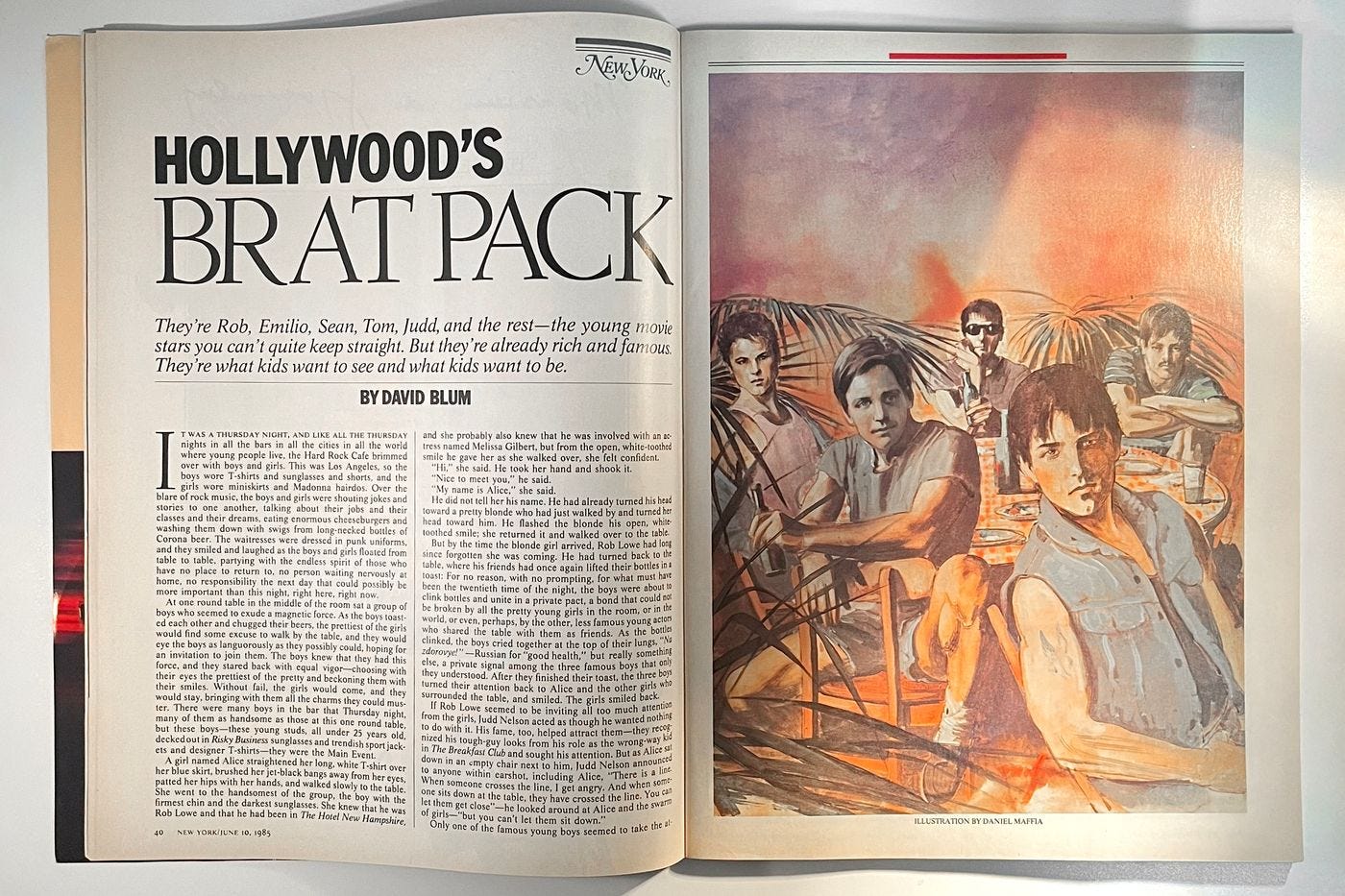
Forgive this wall of text, I've been wanting to talk to people about this for days! I am -- like many -- pretty fascinated by the Brat Pack and was very interested in this, but I wish McCarthy hadn't helmed it. I admire his interest in really unpacking it -- whether personally useful and necessary for him -- or just looking for a later in life chance to make some art and say something meaningful. Unfortunately, he didn't really have the skills to do this the way it deserved/needed to be done. Or perhaps he just wasn't willing to upset the apple cart as much as he needed to in order to get to some more powerful truth (or at least something more interesting?)
I was impressed that he actually interviewed the writer of the article and then chided myself -- Kelly! -- that should be the bare minimum in a documentary like this! I realized I was impressed simply because everything else was such a softball that my expectations had plummeted.
But I will give him credit for one thing -- about 30 (?) minutes in -- the whole thing was starting to feel VERY "insanely rich wildly privileged people whining about a minor thing they suffered while on top of the world in a way almost nobody ever gets to be" -- and he must have realized it during filming and course corrected, because just as it started to become unbearable and very much NOT relatable, he pivoted, and I think it saved the doc from becoming an unmitigated disaster.
But I do wish we'd had someone in there more willing to get their hands dirty and maybe upset their friends a little bit. All that said, it was amazing how clear it was at the end that, in life, attitude and perspective is nearly everything. Moore and Lowe took Brat Pack and turned it into an asset just by how they viewed it -- McCarthy let it haunt him. I wish I was a Moore/Lowe, but I too am a McCarthy. Sigh.
I thought the Documentary wasn't as good as it should have been and made Andrew McCarthy (who has a fine career as a director) come off a bit whiny. It's also tough to judge because Molly Ringwald, Judd Nelson, and Anthony Michael Hall declined to participate. The one-on-one interviews start to become redundant with everyone almost recycling the same sentiment made by each other.
Rob Lowe comes off well, and that's because he is the one person who is so well adjusted to the ebbs and flows of his career and has taken stock of fame throughout the last 40 years. Not to mention he's part of that very successful Parks and Rec. crew. (Side-Note, I think the reason the Parks gang is so successful post-Parks is obviously talent-related, but also Parks was perpetually under the radar while it aired which allowed its cast to break out in other roles once the series came to an end. Also, they don't seem to be dicks).
I don't know what would have made the documentary better, maybe if just focused on AMC more directly, meaning instead of traveling around to each person casually mentioned, he should have examined his own career and the choices he made post St. Elmo's Fire. My entire perception of him comes from the two Weekend at Bernie's movies and those weird cut-away gags in Muppet Babies. where a baby Ms. Piggy would horndog out on him... which really how was that a thing?